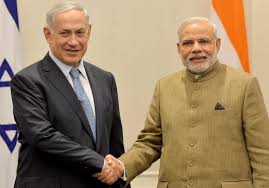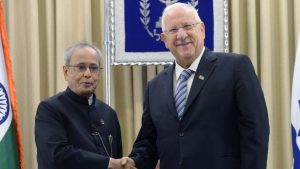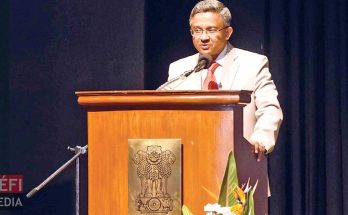 When, not whether? Many observers have pondered over this question regarding a prime ministerial visit to Israel ever since Narendra Modi assumed office. In the light of Modi’s admiration for Israel, which he had visited as chief minister of Gujarat in 2008, some expected that the Jewish State would be one of the first foreign visits he would undertake. More than two-and-half years later, however, there are no signs of such a visit occurring. On the first anniversary of the NDA government on 31 May 2015, External Affairs Minister Sushma Swaraj told the media that the Prime Minister “will also be visiting. Israel will also be visited. No dates have been fixed. When we arrive at mutually convenient dates, that too will be finalized.” Since then Modi has visited four major countries along the Persian Gulf – the UAE, Saudi Arabia, Iran and Qatar – without any sign of an Israeli visit.
When, not whether? Many observers have pondered over this question regarding a prime ministerial visit to Israel ever since Narendra Modi assumed office. In the light of Modi’s admiration for Israel, which he had visited as chief minister of Gujarat in 2008, some expected that the Jewish State would be one of the first foreign visits he would undertake. More than two-and-half years later, however, there are no signs of such a visit occurring. On the first anniversary of the NDA government on 31 May 2015, External Affairs Minister Sushma Swaraj told the media that the Prime Minister “will also be visiting. Israel will also be visited. No dates have been fixed. When we arrive at mutually convenient dates, that too will be finalized.” Since then Modi has visited four major countries along the Persian Gulf – the UAE, Saudi Arabia, Iran and Qatar – without any sign of an Israeli visit.
Notwithstanding that, there have been unprecedented high-level contacts with Israel. In May 2014, Prime Minister Benjamin Netanyahu became the first world leader to congratulate Modi on his landslide victory when most Arab leaders stood stunned at the electoral debacle of the UPA. That September, Modi met Netanyahu on the sidelines of the UN General Assembly and both have been exchanging greetings and messages at regular intervals. Modi also met President Reuven Rivlin during the funeral of Lee Kwan Yew in Singapore in March 2015. President Mukherjee visited Israel (along with Jordan and Palestine) in October 2015, and Rivlin made a reciprocal visit in November 2016. There were also other visits between the two countries including visits by Defence Minister Moshe Ya’alon (February 2015), Sushma Swaraj (January 2016), and Home Minister Rajnath Singh (November 2015).
Such regular engagement with Israel comes against the backdrop of Modi’s high-visibility political visits to the region. He began with a visit to the UAE (the first by a prime minister since May 1981) in August 2015, travelled to Turkey in November 2015 for the G-20 meeting, and followed these up in 2016 with visits to Saudi Arabia (April), Iran (May) and Qatar (June). Israel is the only other major country in the region that he has not visited.
A pattern is noticeable in Modi’s engagements with the Middle East. First and foremost, military-security cooperation occupies a prime place in all bilateral engagements. For example, 17 out of 31 issues that Prime Minister Modi and UAE Crown Prince Sheikh Mohammed bin Zayed Al Nahyan agreed upon pertained to security issues. The same emphasis on security cooperation was also visible in his engagements with Saudi Arabia (nine out of 36 points of agreements), Iran (five out of 12) and Qatar (10 out of 38). Israel would not be different especially when security has been a major area of cooperation since the normalization of relations in January 1992.
Two, unlike in the past, Modi’s visits were preceded or followed by reciprocal visits or bilateral meetings in third countries. Since May 2014, Modi has met Saudi leaders at three G-20 summits in Brisbane, Antalya and Hangzhou. The Emirati Crown Prince visited New Delhi in February 2016 and would be the Chief Guest at the Republic Day Celebrations this month. The Qatari emir visited India in March 2015 and its Prime Minister last December. This pattern may recur in the case of Israel as well. A Modi visit to Israel could be followed by a Netanyahu visit to India.
Three, Modi’s visits to the region have a pattern. Each has been a stand-alone visit and hence did not take away the primary focus from the country visited. In the past, Indian prime ministers tended to visit more than one country at a time and in the process give political engagements a regional flavour. For example, Indira Gandhi visited Kuwait and UAE in 1981, and in November 2008 Manmohan Singh visited Oman and Qatar. President Mukherjee’s visit to Israel in October 2015 was also ‘regional’ as he visited Jordan and Palestine before reaching Israel. His predecessor Pratibha Patil visited UAE and Syria in November 2010, and even Swaraj visited Palestine during her visit to Israel in January 2016.
 Modi has moved away from this pattern and undertaken stand-alone visits to the region. There is widespread consensus that his visit to Israel would be the crowning moment for the year-long commemoration of the 25th anniversary of bilateral relations. Israel too would expect the same from him, that is, not adding Palestine to his itinerary. This is logical and convincing. The political gains of Modi visiting Palestine are rather limited. Not only does Palestine not offer any economic incentives, even its political advantages have diminished over the years. While there is popular support for the Palestinian cause, its relevance for inter-Arab relations is marginal. Much of the Arab world, especially the erstwhile champions of the Palestinians such as Syria, Iraq and Egypt, are deeply embroiled in domestic upheavals and some are even fighting for their own political legitimacy and territorial integrity. The Palestinian cause is their last priority and they are unlikely to modify their policy towards India due to a stand-alone visit by Modi to Israel.
Modi has moved away from this pattern and undertaken stand-alone visits to the region. There is widespread consensus that his visit to Israel would be the crowning moment for the year-long commemoration of the 25th anniversary of bilateral relations. Israel too would expect the same from him, that is, not adding Palestine to his itinerary. This is logical and convincing. The political gains of Modi visiting Palestine are rather limited. Not only does Palestine not offer any economic incentives, even its political advantages have diminished over the years. While there is popular support for the Palestinian cause, its relevance for inter-Arab relations is marginal. Much of the Arab world, especially the erstwhile champions of the Palestinians such as Syria, Iraq and Egypt, are deeply embroiled in domestic upheavals and some are even fighting for their own political legitimacy and territorial integrity. The Palestinian cause is their last priority and they are unlikely to modify their policy towards India due to a stand-alone visit by Modi to Israel.
At best, Modi’s ‘balancing’ visit to Ramallah might temporarily satisfy his domestic critics on the Left who would hail the wisdom of the Nehruvian legacy. But before long they are likely to return to their anti-Modi positions on foreign, domestic and economic policies. Thus, brownie points accruing to Modi through a visit to Palestine are limited, temporary and unattractive.
The only possible justification for a ‘balancing’ visit would be India’s ability to play a meaningful role in bridging Israeli-Palestinian trust deficit and bringing the two parties to the negotiating table. But New Delhi lacks the political will, diplomatic clout and established international acumen to undertake such a role. Even the US, with all its stakes and instruments, has been unable to bridge the gap and India would be well advised to keep away from the quagmire of meddling in the Israel-Palestine conflict.
A standalone visit to Israel will not only be in line with Modi’s engagement with the Middle East but would also send a powerful message to the international community that India is no longer apologetic about befriending Israel. To be meaningful, however, Modi has to establish that such a break would serve India’s geo-strategic interests and would be more beneficial than a courtesy call on Abbas in Ramallah. This would mean Israel opening up avenues of cooperation that are not available to any other country in the world. In practical terms, that would mean strategic Indian investments in hi-tech industries in Israel including military industry, cyber security, Nano technology, alternative energy, and recycling, and India becoming a partner in technology development and sharing. Sensitive technologies are either stolen or bought, but never shared even among friends. Indian investments would be the easiest and, in the long run, the cheapest way to ensure technology transfers from Israel. Should the visit be premised on such an endeavour, Modi’s standalone visit to Israel would be both feasible and likely.
Courtesy:IDSA
Author Profile
- India Writes Network (www.indiawrites.org) is an emerging think tank and a media-publishing company focused on international affairs & the India Story. Centre for Global India Insights is the research arm of India Writes Network. To subscribe to India and the World, write to editor@indiawrites.org. A venture of TGII Media Private Limited, a leading media, publishing and consultancy company, IWN has carved a niche for balanced and exhaustive reporting and analysis of international affairs. Eminent personalities, politicians, diplomats, authors, strategy gurus and news-makers have contributed to India Writes Network, as also “India and the World,” a magazine focused on global affairs.
Latest entries
 DiplomacyApril 10, 2024Diplomat-author Lakshmi Puri pitches for women power at LSR
DiplomacyApril 10, 2024Diplomat-author Lakshmi Puri pitches for women power at LSR India and the WorldApril 6, 2024UN envoy pitches to take India’s solutions to the world stage
India and the WorldApril 6, 2024UN envoy pitches to take India’s solutions to the world stage CultureApril 5, 2024Youth in Diplomacy: Making it Matter with LSR Model UN 2024
CultureApril 5, 2024Youth in Diplomacy: Making it Matter with LSR Model UN 2024 India and the WorldMarch 28, 2024India to China: Normalization of troops deployment imperative for restoring ties
India and the WorldMarch 28, 2024India to China: Normalization of troops deployment imperative for restoring ties







